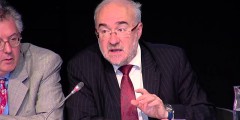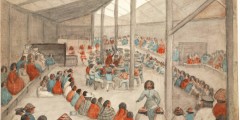The IPCC report: Impacts, adaptation and vulnerabilities
March 4, 2022
When I think about the latest IPCC report, which came out on 28 February, these sentences come to my (German) mind: Eintritt streng verboten! Eintritt strengstens verboten!! Eintritt allerstrengstens verboten!!! (Entry strictly forbidden. Entry very strictly forbidden. Entry extremely strictly forbidden.) These words are written on warning signs that adorn three doors in the classic …
IPCC reports, climate change and language work
September 6, 2021
This blog post is not about climate change communication. It is about what I call the ‘language work’ carried out by scientists when writing the various IPCC reports. Introduction On 9 August 2021 the first part of the Sixth Assessment Report of the Intergovernmental Panel on Climate Change, namely the Contribution of Working Group 1 …
Improving climate change communications: moving beyond scientific certainty
June 8, 2015
This is a co-authored post with Gregory Hollin. It is based upon our new paper in Nature Climate Change, which is the first piece of original research from science and technology studies (STS) published in the journal. In the last 25 years scientists have become increasingly certain that humans are responsible for changes to the …
Climate realism: What does it mean?
April 13, 2014
During the publications of the various IPCC reports between September last year and today, I have increasingly come across the words ‘realism’ and ‘climate realism’. Here are just some examples: In a BBC report Roger Harrabin says about a draft of the IPCC WG3 report that it “adopts a new tone of realism”. This echoes …
Consensus on climate change: Tracing the contours of a debate
August 23, 2013
Soon the new IPCC report on climate change will be published (a leaked version is already circulating). This will probably generate a lot of talk about what one may call the four Cs: Consensus, certainty, confidence and credibility (let alone the other two Cs: climate and change). The discussion about consensus is already in full …
Inside climate science: the opening and closing of IPCC expertise
December 12, 2012
This is a guest post by the University of Nottingham’s Paul Matthews – outlining what he can (and can’t!) divulge about the IPCC’s peer review process. The Intergovernmental Panel on Climate Change (IPCC) is the scientific body established by the United Nations to provide assessments of current knowledge in this complex and controversial field of …






